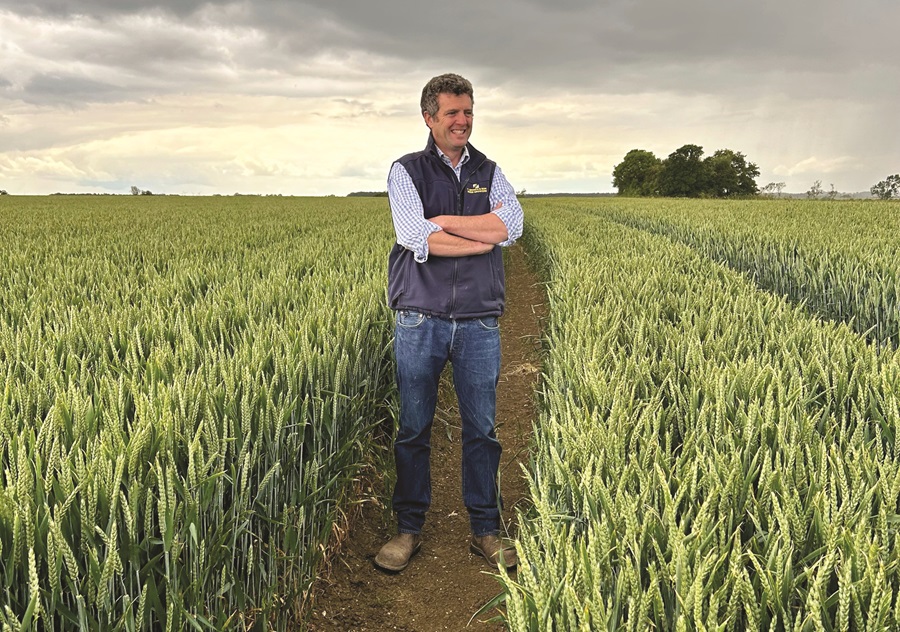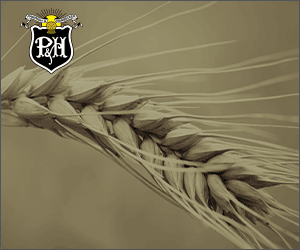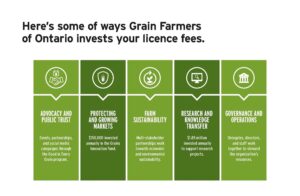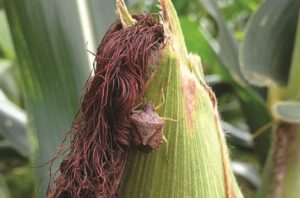Growing great wheat
LEARNINGS FROM THE U.K. YEN

IN JUNE 2024, THREE MEMBERS OF THE GREAT LAKES YIELD ENHANCEMENT NETWORK (YEN) LEADERSHIP TEAM TRAVELLED TO THE UNITED KINGDOM TO MEET FARMERS who have participated in the U.K. YEN for over a decade, learning about the obstacles they face and discovering how the YEN program has benefited their management decisions. The original YEN program was started by ADAS — the U.K.’s largest independent agricultural and environmental consultancy provider, and now part of the larger RSK Group.
The climate in the U.K. is milder than in Ontario, leading to a longer and slower growing season, which has helped some of its growers achieve world record-breaking winter wheat yields. This year, the United Kingdom is facing its wettest growing season in over 100 years, which led to delayed planting and stressful management decisions for their over 110,000 farmers — something Ontario growers can empathize with.
Farming in Lincolnshire Wolds, Mark Stubbs achieved the highest winter wheat yield in 2023 at 16.6 tonnes/hectare (246.8 bushels/ acre). Also recognized for his award-winning spring barley yields, Stubbs focuses on improving the health of his chalky soils through both cover crops and manure applications, noting that when it comes to his soil health, “good nutrition means fewer product applications.” By incorporating cover crops into his rotation, Stubbs has managed to significantly increase his soil organic matter over the last 10 years. He tailors his cover crop species to the specific field he’s working on to achieve the targeted below-ground root system. Stubbs also aims to apply roughly five tonnes/hectare of broiler manure on his wheat fields every year but has experimented with different manure blends to strike the right nutrient balance. Michael Brown, who farms in Covington, Cambridgeshire, shared with the group the challenges of growing wheat, herbs, and vegetables for seed. Variety development in the U.K. is done almost entirely through private funds, without academia or governmental ministry support. Variety testing is completed by the Agriculture and Horticulture Development Board (AHDB) — a levy board that supports multiple agricultural commodities through both research and market development.
WEEDS, DISEASES, AND PESTS
Brown was the first of many U.K. farmers to share with the group the challenges he’s had with black-grass. Black-grass (Alopecurus myosuroides) is one of the hardest weeds to control in U.K. winter wheat fields, with severe infestations resulting in up to 70 per cent yield losses. While it can be virtually impossible to eradicate once present in a field, growers can implement certain practices, such as delayed planting in the fall combined with herbicide application, to minimize damage.
Fusarium is the disease Ontario farmers are worried about most in their winter wheat; however, growers in the U.K. don’t see similar levels of the fungal disease due to the lack of humidity that the Great Lakes region experiences. With the continuous wet weather, rusts are much more prevalent in the U.K. and are prioritized when making fungicide applications. Brown rust (known in Ontario as leaf rust) is the number one disease affecting U.K. wheat growers this year. Yellow rust (also known as stripe rust) is also widespread in the U.K. and has occurred across Ontario this year due to the wet spring. Fungicides are available for both types of rust, but ensuring that products are applied at the recommended timing is critical for adequate control in addition to varietal resistance. While rusts and weeds are the primary pests cereal growers are facing in the U.K., insect pests such as the cabbage stem flea beetle (Phyllotreta striolata) are targeting another commonly grown crop — oilseed rape. Mark Stubbs was, up until recently, a top oilseed rape grower in the country. After flea beetle decimated his yields by 60 per cent, Stubbs removed the crop from his rotation entirely and now rotates between winter wheat and cover crop mixes that include legumes such as daikon radish. Joe Vickers, who grows winter wheat, packing potatoes, and several types of vegetables on fields in the Boston and Lincolnshire area, noted that he is planting fewer fields of oilseed rape this year specifically due to flea beetle and Brown stopped growing the crop after neonicotinoid insecticides were banned across the European Union.
SAMPLING AND ANALYSIS
Some growers who have participated in the YEN program over the last few years have taken the sampling and analysis required as part of the program a step further — Joe Vickers has started experimenting with in-field tissue testing to influence his management decisions. By implementing SAP testing and Brix refractometers in the field, Vickers is trying to determine in real- time the nutrient uptake of the plant. He hopes that this will allow him to tweak his inputs during the season, leading to the most efficient use of fertilizers while helping him achieve higher yields.
Each of the farmers shared how the final report they receive from participating in the YEN is what encourages them to sign up for the program year-over-year. Even farmers who have fine-tuned their recipe for success, such as multiple world-record award winner Tim Lamyman, continue to participate in the YEN because the robust summary report at the end of the season provides him with the opportunity to learn something new every year. Lamyman noted that with the constant changes farmers are facing, such as new pest pressures and increasing pesticide resistance, continually learning what aspects of his crop management could be improved and discovering what practices his neighbours are implementing is critical for his success.
To learn more about the YEN programs managed by ADAS, visit www.yen.adas.co.uk.
To learn more about the Great Lakes YEN program, visit www.greatlakesyen.com.
Alexandra Dacey, M.Sc., is Grain Farmers of Ontario’s agronomy project coordinator. •



























